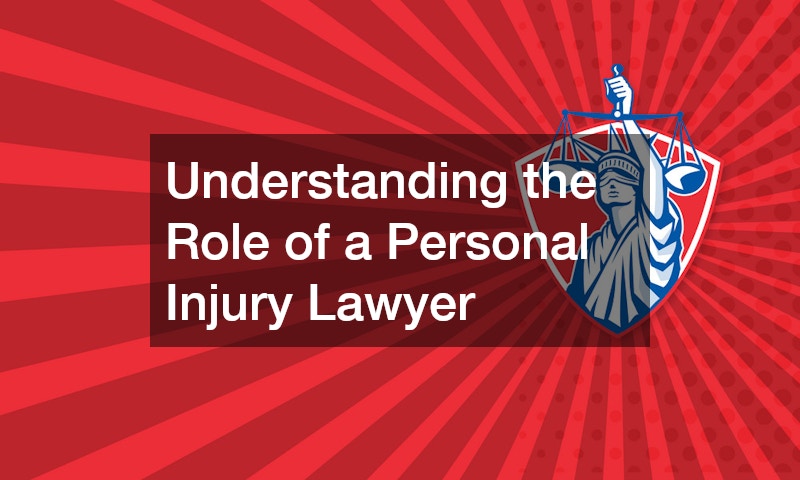Personal injury lawyers play a pivotal role in the legal services field by advocating for individuals who have been harmed due to the negligence or wrongful actions of others. They navigate the complexities of personal injury claims, offering both representation and expert guidance to ensure their clients receive compensation for medical bills, lost wages, and pain and suffering. Understanding the services these lawyers provide is essential for anyone seeking justice and fair compensation for their injuries.
What Does a Personal Injury Lawyer Do?
Personal injury lawyers represent their clients in legal matters to ensure they receive the compensation they deserve following an unfortunate incident. Their scope of practice often includes handling cases related to auto accidents, workplace injuries, and medical malpractice, necessitating a deep understanding of various legal frameworks. By adeptly negotiating settlements or representing clients in court, they work tirelessly to achieve favorable outcomes for affected individuals.
The professionals in this field are responsible for managing all aspects of a client’s case from the initial assessment to the resolution of the claim. They conduct thorough investigations, gather evidence, and consult with experts to build a robust case on behalf of their clients. Litigation is a possibility in many personal injury cases, and these lawyers are prepared to advocate fiercely in court if necessary.
Moreover, personal injury lawyers provide invaluable support by advising their clients on their legal rights and potential outcomes, helping them understand what to expect at every stage of the process. This guidance is especially important in an often stressful and unfamiliar legal environment, where individuals may feel overwhelmed by the complexities of their cases. Additionally, personal injury lawyers ensure that all legal documents are filed promptly and correctly, which not only helps to expedite legal proceedings but also brings peace of mind to their clients by knowing that everything is being handled efficiently and professionally.
How to Choose a Personal Injury Lawyer?
Choosing the right personal injury lawyer is a critical decision that can significantly impact the success of a claim. Experience in handling similar cases stands out as one of the most important factors, ensuring the lawyer is well-versed in the relevant areas of law. A lawyer’s reputation and track record of success offer insight into their effectiveness and reliability in securing favorable settlements or verdicts.
Equally important is the lawyer’s ability to communicate clearly and effectively with their clients. Good communication fosters trust and ensures clients are kept informed at every stage of their case, which can alleviate stress and confusion. Prospective clients should feel comfortable discussing their cases with the lawyer, confident that their concerns will be addressed promptly and comprehensively.
Additionally, potential clients should consider the payment and fee structures when selecting a personal injury lawyer. Many attorneys operate on a contingency fee basis, meaning their payment depends on the successful resolution of a case. Understanding these terms beforehand provides transparency and helps clients avoid unexpected financial burdens.
What is the Process of a Personal Injury Claim?

The process of filing a personal injury claim begins with an initial consultation, during which the lawyer assesses the merits of the case and advises on potential outcomes. Following this, a thorough investigation is conducted to gather evidence, consult experts, and build a compelling case to support the client’s claim. Once the evidence is compiled, the lawyer may attempt to negotiate a settlement with the responsible party or their insurance company to avoid the time and expense of a trial.
If a fair settlement cannot be reached through negotiations, the lawyer will initiate a lawsuit and move forward into the litigation stage. This process begins with the preparation of crucial legal documents, including the complaint, motions, and responses, which outline the claims and defenses involved in the case. The lawyer will also conduct depositions, where witnesses and parties involved in the case provide sworn testimony, and gather additional evidence to support the client’s position.
Should the case proceed to court, the lawyer will serve as the client’s primary advocate, representing them during hearings, trials, and potentially appeals. In the courtroom, the lawyer’s expertise is critical in presenting the case clearly and persuasively to a judge or jury, highlighting key evidence and making compelling arguments to support the client’s position. Throughout the litigation process, the lawyer must navigate complex legal procedures with precision, keeping every detail of the case meticulously prepared, all while safeguarding the client’s rights.
During these proceedings, the lawyer continuously communicates with their client, providing updates and explaining each stage of the case in detail. They play an invaluable role in managing client expectations and alleviating the stress that often accompanies legal disputes. Ultimately, the goal is to achieve a resolution that reflects the justice and compensation deserved.
Understanding the role, responsibilities, and processes associated with personal injury lawyers can significantly empower individuals to make informed decisions after an injury. By gaining knowledge of how personal injury lawyers evaluate cases, handle negotiations, and guide clients through legal proceedings, individuals can better navigate the often complex world of insurance claims and legal disputes. With a clear understanding of what to expect and how to choose the right legal assistance, individuals can confidently take the necessary steps to secure the compensation they deserve, ensuring their recovery process is as smooth and effective as possible.



